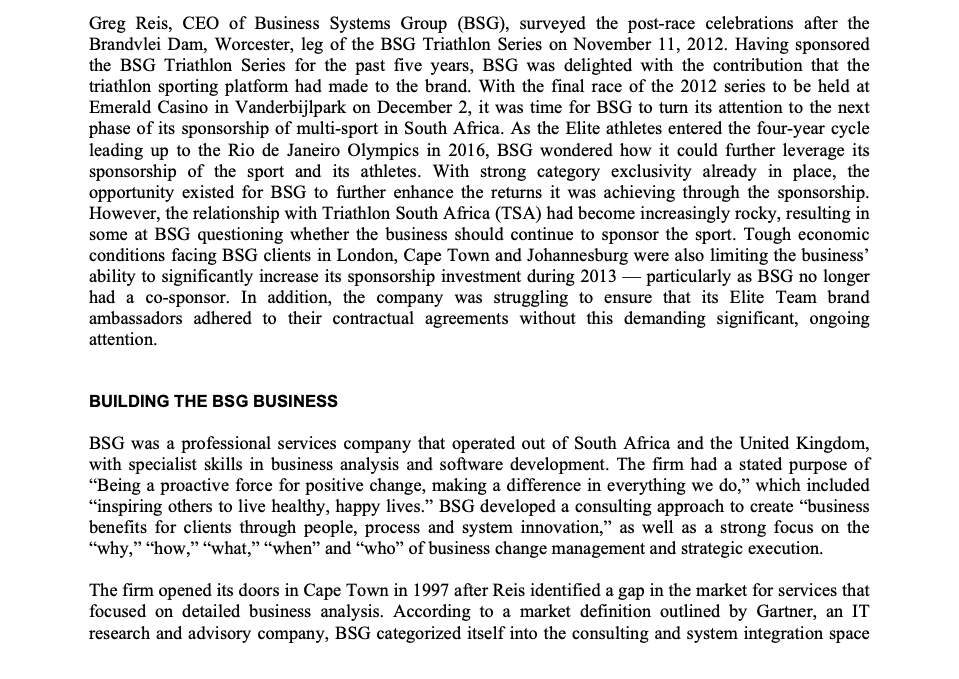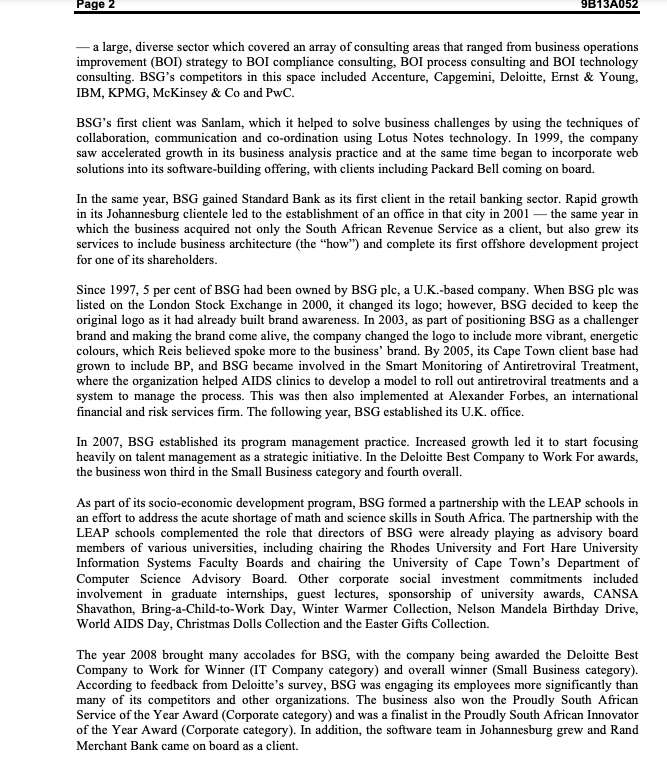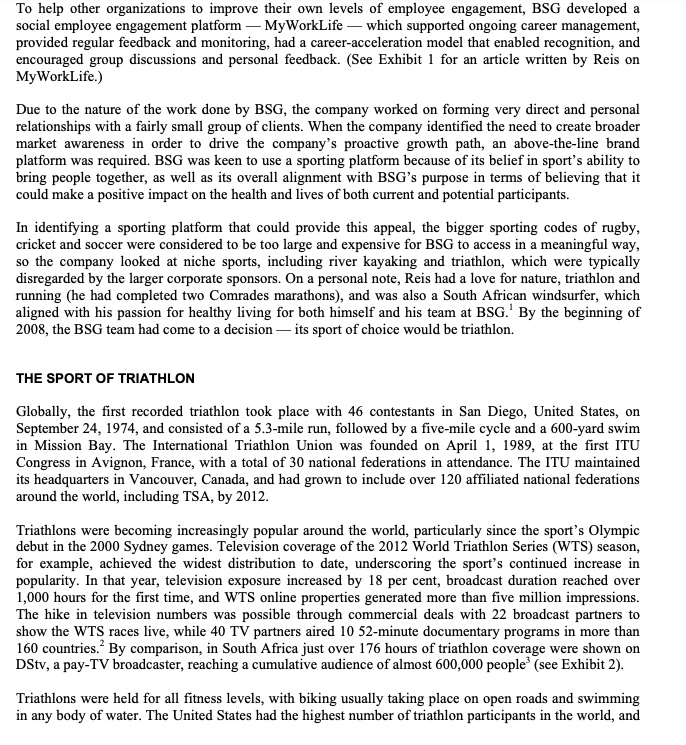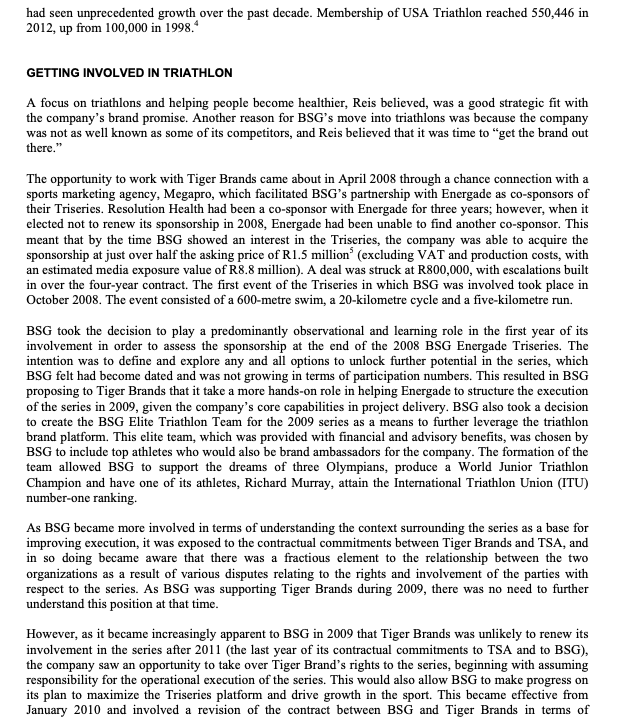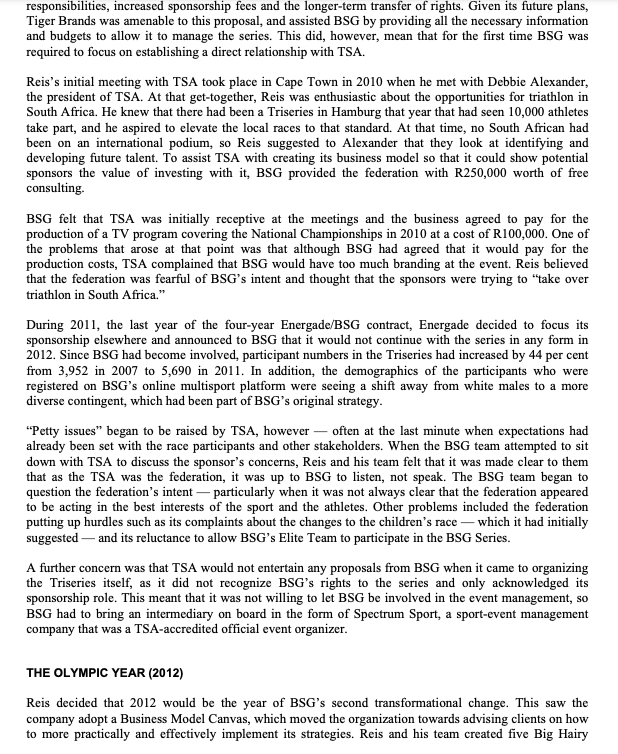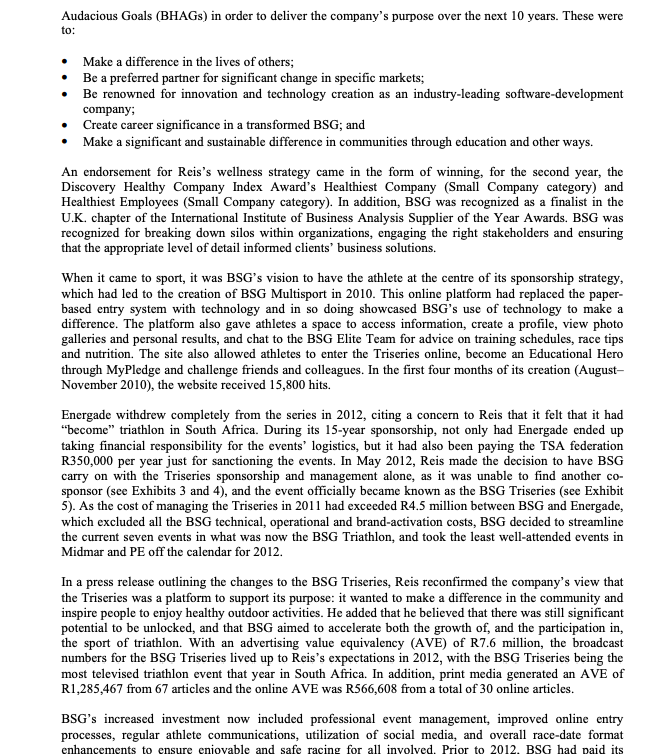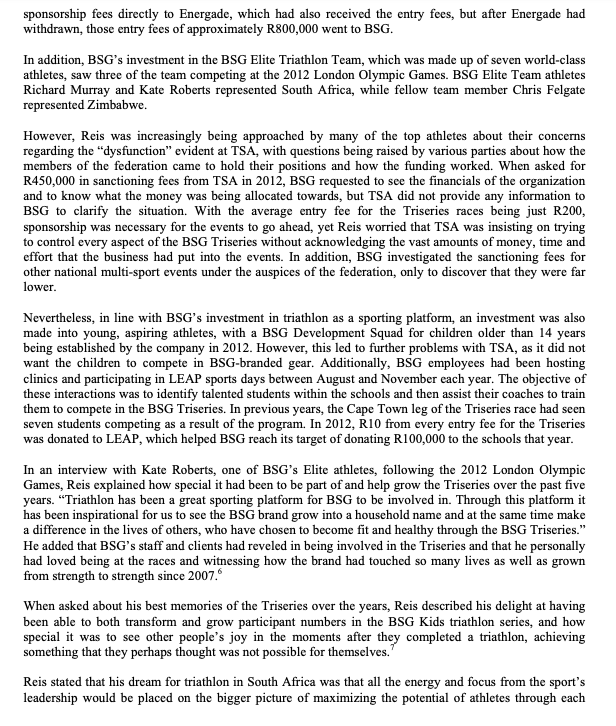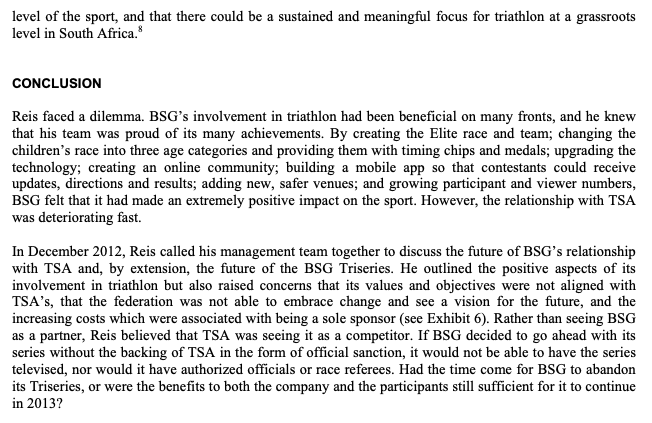Business System Group
1. What makes the sponsorship arrangement between BSG and TSA unique relative to how we typically think of such relationships?
2. What has led to the strained relationship between BSG and TSA?
3. As the BSG management team, would you vote to renew the sponsorship or not? Why?
Greg Reis, CEO of Business Systems Group (BSG), surveyed the post-race celebrations after the Brandvlei Dam, Worcester, leg of the BSG Triathlon Series on November 11, 2012. Having sponsored the BSG Triathlon Series for the past five years, BSG was delighted with the contribution that the triathlon sporting platform had made to the brand. With the final race of the 2012 series to be held at Emerald Casino in Vanderbijlpark on December 2, it was time for BSG to turn its attention to the next phase of its sponsorship of multi-sport in South Africa. As the Elite athletes entered the four-year cycle leading up to the Rio de Janeiro Olympics in 2016, BSG wondered how it could further leverage its sponsorship of the sport and its athletes. With strong category exclusivity already in place, the opportunity existed for BSG to further enhance the returns it was achieving through the sponsorship. However, the relationship with Triathlon South Africa (TSA) had become increasingly rocky, resulting in some at BSG questioning whether the business should continue to sponsor the sport. Tough economic conditions facing BSG clients in London, Cape Town and Johannesburg were also limiting the business' ability to significantly increase its sponsorship investment during 2013 - particularly as BSG no longer had a co-sponsor. In addition, the company was struggling to ensure that its Elite Team brand ambassadors adhered to their contractual agreements without this demanding significant, ongoing attention. BUILDING THE BSG BUSINESS BSG was a professional services company that operated out of South Africa and the United Kingdom, with specialist skills in business analysis and software development. The firm had a stated purpose of "Being a proactive force for positive change, making a difference in everything we do," which included "inspiring others to live healthy, happy lives." BSG developed a consulting approach to create "business benefits for clients through people, process and system innovation," as well as a strong focus on the "why," "how," "what," "when" and "who" of business change management and strategic execution. The firm opened its doors in Cape Town in 1997 after Reis identified a gap in the market for services that focused on detailed business analysis. According to a market definition outlined by Gartner, an IT research and advisory company, BSG categorized itself into the consulting and system integration spacePage 2 9B13A052 - a large, diverse sector which covered an array of consulting areas that ranged from business operations improvement (BOI) strategy to BOI compliance consulting, BOI process consulting and BOI technology consulting. BSG's competitors in this space included Accenture, Capgemini, Deloitte, Ernst & Young, IBM, KPMG, Mckinsey & Co and PwC. BSG's first client was Sanlam, which it helped to solve business challenges by using the techniques of collaboration, communication and co-ordination using Lotus Notes technology. In 1999, the company saw accelerated growth in its business analysis practice and at the same time began to incorporate web solutions into its software-building offering, with clients including Packard Bell coming on board In the same year, BSG gained Standard Bank as its first client in the retail banking sector. Rapid growth in its Johannesburg clientele led to the establishment of an office in that city in 2001 - the same year in which the business acquired not only the South African Revenue Service as a client, but also grew its services to include business architecture (the "how") and complete its first offshore development project for one of its shareholders. Since 1997, 5 per cent of BSG had been owned by BSG plc, a U.K.-based company. When BSG plc was listed on the London Stock Exchange in 2000, it changed its logo; however, BSG decided to keep the original logo as it had already built brand awareness. In 2003, as part of positioning BSG as a challenger brand and making the brand come alive, the company changed the logo to include more vibrant, energetic colours, which Reis believed spoke more to the business' brand. By 2005, its Cape Town client base had grown to include BP, and BSG became involved in the Smart Monitoring of Antiretroviral Treatment, where the organization helped AIDS clinics to develop a model to roll out antiretroviral treatments and a system to manage the process. This was then also implemented at Alexander Forbes, an international financial and risk services firm. The following year, BSG established its U.K. office. In 2007, BSG established its program management practice. Increased growth led it to start focusing heavily on talent management as a strategic initiative. In the Deloitte Best Company to Work For awards, the business won third in the Small Business category and fourth overall. As part of its socio-economic development program, BSG formed a partnership with the LEAP schools in an effort to address the acute shortage of math and science skills in South Africa. The partnership with the LEAP schools complemented the role that directors of BSG were already playing as advisory board members of various universities, including chairing the Rhodes University and Fort Hare University Information Systems Faculty Boards and chairing the University of Cape Town's Department of Computer Science Advisory Board. Other corporate social investment commitments included involvement in graduate internships, guest lectures, sponsorship of university awards, CANSA Shavathon, Bring-a-Child-to-Work Day, Winter Warmer Collection, Nelson Mandela Birthday Drive, World AIDS Day, Christmas Dolls Collection and the Easter Gifts Collection. The year 2008 brought many accolades for BSG, with the company being awarded the Deloitte Best Company to Work for Winner (IT Company category) and overall winner (Small Business category). According to feedback from Deloitte's survey, BSG was engaging its employees more significantly than many of its competitors and other organizations. The business also won the Proudly South African Service of the Year Award (Corporate category) and was a finalist in the Proudly South African Innovator of the Year Award (Corporate category). In addition, the software team in Johannesburg grew and Rand Merchant Bank came on board as a client.To help other organizations to improve their own levels of employee engagement, BSG developed a social employee engagement platform - MyWorkLife - which supported ongoing career management, provided regular feedback and monitoring, had a career-acceleration model that enabled recognition, and encouraged group discussions and personal feedback. (See Exhibit 1 for an article written by Reis on MyWorkLife.) Due to the nature of the work done by BSG, the company worked on forming very direct and personal relationships with a fairly small group of clients. When the company identified the need to create broader market awareness in order to drive the company's proactive growth path, an above-the-line brand platform was required. BSG was keen to use a sporting platform because of its belief in sport's ability to bring people together, as well as its overall alignment with BSG's purpose in terms of believing that it could make a positive impact on the health and lives of both current and potential participants. In identifying a sporting platform that could provide this appeal, the bigger sporting codes of rugby, cricket and soccer were considered to be too large and expensive for BSG to access in a meaningful way, so the company looked at niche sports, including river kayaking and triathlon, which were typically disregarded by the larger corporate sponsors. On a personal note, Reis had a love for nature, triathlon and running (he had completed two Comrades marathons), and was also a South African windsurfer, which aligned with his passion for healthy living for both himself and his team at BSG.' By the beginning of 2008, the BSG team had come to a decision - its sport of choice would be triathlon. THE SPORT OF TRIATHLON Globally, the first recorded triathlon took place with 46 contestants in San Diego, United States, on September 24, 1974, and consisted of a 5.3-mile run, followed by a five-mile cycle and a 600-yard swim in Mission Bay. The International Triathlon Union was founded on April 1, 1989, at the first ITU Congress in Avignon, France, with a total of 30 national federations in attendance. The ITU maintained its headquarters in Vancouver, Canada, and had grown to include over 120 affiliated national federations around the world, including TSA, by 2012 Triathlons were becoming increasingly popular around the world, particularly since the sport's Olympic debut in the 2000 Sydney games. Television coverage of the 2012 World Triathlon Series (WTS) season, for example, achieved the widest distribution to date, underscoring the sport's continued increase in popularity. In that year, television exposure increased by 18 per cent, broadcast duration reached over 1,000 hours for the first time, and WTS online properties generated more than five million impressions. The hike in television numbers was possible through commercial deals with 22 broadcast partners to show the WTS races live, while 40 TV partners aired 10 52-minute documentary programs in more than 160 countries." By comparison, in South Africa just over 176 hours of triathlon coverage were shown on DStv, a pay-TV broadcaster, reaching a cumulative audience of almost 600,000 people (see Exhibit 2). Triathlons were held for all fitness levels, with biking usually taking place on open roads and swimming in any body of water. The United States had the highest number of triathlon participants in the world, andhad seen unprecedented growth over the past decade. Membership of USA Triathlon reached 550,446 in 2012, up from 100,000 in 1998.* GETTING INVOLVED IN TRIATHLON A focus on triathlons and helping people become healthier, Reis believed, was a good strategic fit with the company's brand promise. Another reason for BSG's move into triathlons was because the company was not as well known as some of its competitors, and Reis believed that it was time to "get the brand out there." The opportunity to work with Tiger Brands came about in April 2008 through a chance connection with a sports marketing agency, Megapro, which facilitated BSG's partnership with Energade as co-sponsors of their Triseries. Resolution Health had been a co-sponsor with Energade for three years; however, when it elected not to renew its sponsorship in 2008, Energade had been unable to find another co-sponsor. This meant that by the time BSG showed an interest in the Triseries, the company was able to acquire the sponsorship at just over half the asking price of R1.5 million' (excluding VAT and production costs, with an estimated media exposure value of R8.8 million). A deal was struck at R800,000, with escalations built in over the four-year contract. The first event of the Triseries in which BSG was involved took place in October 2008. The event consisted of a 600-metre swim, a 20-kilometre cycle and a five-kilometre run. BSG took the decision to play a predominantly observational and learning role in the first year of its involvement in order to assess the sponsorship at the end of the 2008 BSG Energade Triseries. The intention was to define and explore any and all options to unlock further potential in the series, which BSG felt had become dated and was not growing in terms of participation numbers. This resulted in BSG proposing to Tiger Brands that it take a more hands-on role in helping Energade to structure the execution of the series in 2009, given the company's core capabilities in project delivery. BSG also took a decision to create the BSG Elite Triathlon Team for the 2009 series as a means to further leverage the triathlon brand platform. This elite team, which was provided with financial and advisory benefits, was chosen by BSG to include top athletes who would also be brand ambassadors for the company. The formation of the team allowed BSG to support the dreams of three Olympians, produce a World Junior Triathlon Champion and have one of its athletes, Richard Murray, attain the International Triathlon Union (ITU) number-one ranking. As BSG became more involved in terms of understanding the context surrounding the series as a base for improving execution, it was exposed to the contractual commitments between Tiger Brands and TSA, and in so doing became aware that there was a fractious element to the relationship between the two organizations as a result of various disputes relating to the rights and involvement of the parties with respect to the series. As BSG was supporting Tiger Brands during 2009, there was no need to further understand this position at that time. However, as it became increasingly apparent to BSG in 2009 that Tiger Brands was unlikely to renew its involvement in the series after 2011 (the last year of its contractual commitments to TSA and to BSG), the company saw an opportunity to take over Tiger Brand's rights to the series, beginning with assuming responsibility for the operational execution of the series. This would also allow BSG to make progress on its plan to maximize the Triseries platform and drive growth in the sport. This became effective from January 2010 and involved a revision of the contract between BSG and Tiger Brands in terms ofresponsibilities, increased sponsorship fees and the longer-term transfer of rights. Given its future plans, Tiger Brands was amenable to this proposal, and assisted BSG by providing all the necessary information and budgets to allow it to manage the series. This did, however, mean that for the first time BSG was required to focus on establishing a direct relationship with TSA. Reis's initial meeting with TSA took place in Cape Town in 2010 when he met with Debbie Alexander, the president of TSA. At that get-together, Reis was enthusiastic about the opportunities for triathlon in South Africa. He knew that there had been a Triseries in Hamburg that year that had seen 10,000 athletes take part, and he aspired to elevate the local races to that standard. At that time, no South African had been on an international podium, so Reis suggested to Alexander that they look at identifying and developing future talent. To assist TSA with creating its business model so that it could show potential sponsors the value of investing with it, BSG provided the federation with R250,000 worth of free consulting. BSG felt that TSA was initially receptive at the meetings and the business agreed to pay for the production of a TV program covering the National Championships in 2010 at a cost of R100,000. One of the problems that arose at that point was that although BSG had agreed that it would pay for the production costs, TSA complained that BSG would have too much branding at the event. Reis believed that the federation was fearful of BSG's intent and thought that the sponsors were trying to "take over triathlon in South Africa." During 2011, the last year of the four-year Energade/BSG contract, Energade decided to focus its sponsorship elsewhere and announced to BSG that it would not continue with the series in any form in 2012. Since BSG had become involved, participant numbers in the Triseries had increased by 44 per cent from 3,952 in 2007 to 5,690 in 2011. In addition, the demographics of the participants who were registered on BSG's online multisport platform were seeing a shift away from white males to a more diverse contingent, which had been part of BSG's original strategy. "Petty issues" began to be raised by TSA, however - often at the last minute when expectations had already been set with the race participants and other stakeholders. When the BSG team attempted to sit down with TSA to discuss the sponsor's concerns, Reis and his team felt that it was made clear to them that as the TSA was the federation, it was up to BSG to listen, not speak. The BSG team began to question the federation's intent - particularly when it was not always clear that the federation appeared to be acting in the best interests of the sport and the athletes. Other problems included the federation putting up hurdles such as its complaints about the changes to the children's race - which it had initially suggested - and its reluctance to allow BSG's Elite Team to participate in the BSG Series. A further concern was that TSA would not entertain any proposals from BSG when it came to organizing the Triseries itself, as it did not recognize BSG's rights to the series and only acknowledged its sponsorship role. This meant that it was not willing to let BSG be involved in the event management, so BSG had to bring an intermediary on board in the form of Spectrum Sport, a sport-event management company that was a TSA-accredited official event organizer. THE OLYMPIC YEAR (2012) Reis decided that 2012 would be the year of BSG's second transformational change. This saw the company adopt a Business Model Canvas, which moved the organization towards advising clients on how to more practically and effectively implement its strategies. Reis and his team created five Big HairyAudacious Goals (BHAGs) in order to deliver the company's purpose over the next 10 years. These were to: Make a difference in the lives of others; Be a preferred partner for significant change in specific markets; Be renowned for innovation and technology creation as an industry-leading software-development company; Create career significance in a transformed BSG; and . Make a significant and sustainable difference in communities through education and other ways. An endorsement for Reis's wellness strategy came in the form of winning, for the second year, the Discovery Healthy Company Index Award's Healthiest Company (Small Company category) and Healthiest Employees (Small Company category). In addition, BSG was recognized as a finalist in the U.K. chapter of the International Institute of Business Analysis Supplier of the Year Awards. BSG was recognized for breaking down silos within organizations, engaging the right stakeholders and ensuring that the appropriate level of detail informed clients' business solutions. When it came to sport, it was BSG's vision to have the athlete at the centre of its sponsorship strategy, which had led to the creation of BSG Multisport in 2010. This online platform had replaced the paper- based entry system with technology and in so doing showcased BSG's use of technology to make a difference. The platform also gave athletes a space to access information, create a profile, view photo galleries and personal results, and chat to the BSG Elite Team for advice on training schedules, race tips and nutrition. The site also allowed athletes to enter the Triseries online, become an Educational Hero through MyPledge and challenge friends and colleagues. In the first four months of its creation (August- November 2010), the website received 15,800 hits. Energade withdrew completely from the series in 2012, citing a concern to Reis that it felt that it had "become" triathlon in South Africa. During its 15-year sponsorship, not only had Energade ended up taking financial responsibility for the events' logistics, but it had also been paying the TSA federation R350,000 per year just for sanctioning the events. In May 2012, Reis made the decision to have BSG carry on with the Triseries sponsorship and management alone, as it was unable to find another co- sponsor (see Exhibits 3 and 4), and the event officially became known as the BSG Triseries (see Exhibit 5). As the cost of managing the Triseries in 2011 had exceeded R4.5 million between BSG and Energade, which excluded all the BSG technical, operational and brand-activation costs, BSG decided to streamline the current seven events in what was now the BSG Triathlon, and took the least well-attended events in Midmar and PE off the calendar for 2012. In a press release outlining the changes to the BSG Triseries, Reis reconfirmed the company's view that the Triseries was a platform to support its purpose: it wanted to make a difference in the community and inspire people to enjoy healthy outdoor activities. He added that he believed that there was still significant potential to be unlocked, and that BSG aimed to accelerate both the growth of, and the participation in, the sport of triathlon. With an advertising value equivalency (AVE) of R7.6 million, the broadcast numbers for the BSG Triseries lived up to Reis's expectations in 2012, with the BSG Triseries being the most televised triathlon event that year in South Africa. In addition, print media generated an AVE of R1,285,467 from 67 articles and the online AVE was R566,608 from a total of 30 online articles. BSG's increased investment now included professional event management, improved online entry processes, regular athlete communications, utilization of social media, and overall race-date format ent all in olved. Prior 2012. BSG had paid itsponsorship fees directly to Energade, which had also received the entry fees, but after Energade had withdrawn, those entry fees of approximately R800,000 went to BSG. In addition, BSG's investment in the BSG Elite Triathlon Team, which was made up of seven world-class athletes, saw three of the team competing at the 2012 London Olympic Games. BSG Elite Team athletes Richard Murray and Kate Roberts represented South Africa, while fellow team member Chris Felgate represented Zimbabwe. However, Reis was increasingly being approached by many of the top athletes about their concerns regarding the "dysfunction" evident at TSA, with questions being raised by various parties about how the members of the federation came to hold their positions and how the funding worked. When asked for R450,000 in sanctioning fees from TSA in 2012, BSG requested to see the financials of the organization and to know what the money was being allocated towards, but TSA did not provide any information to BSG to clarify the situation. With the average entry fee for the Triseries races being just R200, sponsorship was necessary for the events to go ahead, yet Reis worried that TSA was insisting on trying to control every aspect of the BSG Triseries without acknowledging the vast amounts of money, time and effort that the business had put into the events. In addition, BSG investigated the sanctioning fees for other national multi-sport events under the auspices of the federation, only to discover that they were far lower. Nevertheless, in line with BSG's investment in triathlon as a sporting platform, an investment was also made into young, aspiring athletes, with a BSG Development Squad for children older than 14 years being established by the company in 2012. However, this led to further problems with TSA, as it did not want the children to compete in BSG-branded gear. Additionally, BSG employees had been hosting clinics and participating in LEAP sports days between August and November each year. The objective of these interactions was to identify talented students within the schools and then assist their coaches to train them to compete in the BSG Triseries. In previous years, the Cape Town leg of the Triseries race had seen seven students competing as a result of the program. In 2012, R10 from every entry fee for the Triseries was donated to LEAP, which helped BSG reach its target of donating R100,000 to the schools that year. In an interview with Kate Roberts, one of BSG's Elite athletes, following the 2012 London Olympic Games, Reis explained how special it had been to be part of and help grow the Triseries over the past five years. "Triathlon has been a great sporting platform for BSG to be involved in. Through this platform it has been inspirational for us to see the BSG brand grow into a household name and at the same time make a difference in the lives of others, who have chosen to become fit and healthy through the BSG Triseries." He added that BSG's staff and clients had reveled in being involved in the Triseries and that he personally had loved being at the races and witnessing how the brand had touched so many lives as well as grown from strength to strength since 2007." When asked about his best memories of the Triseries over the years, Reis described his delight at having been able to both transform and grow participant numbers in the BSG Kids triathlon series, and how special it was to see other people's joy in the moments after they completed a triathlon, achieving something that they perhaps thought was not possible for themselves.' Reis stated that his dream for triathlon in South Africa was that all the energy and focus from the sport's leadership would be placed on the bigger picture of maximizing the potential of athletes through eachlevel of the sport. and that there could be a sustained and meaningil focus for triathlon at a grassroots level in South Aft-ices GHCLUEIDH Reis faced a dilemma. BSG's involvement in triathlon had been beneficial on many fronts, and he knew that his team was pmud of its man}.r achievements. By creating the Elite race and team; changing the children's race into three age categories and providing them with timing chips and medals; upgrading the technology; creating an online community; building a mobile app so that contestants could receive updates. directions and results; adding new; safer venues; and growing participant and viewer numbers; BEG felt that it had made an extremelyr positive impact on the sport. However, the relationship with TEA was deteriorating fast. In December lll, Reis called his management team together to discuss the future of 1356's relationship with TSA and; by extension; the future of the EEG Triseries. He outlined the positive aspects of its involvement in triathlon but also raised concerns that its values and objectives were not aligned with TEN-'13s1 that the federation was not able to embrace change and see a vision for the future1 and the increasing costs which were associated with being a sole sponsor [see Exhibit 15}. Rather than seeing BEG as a partner. Reis believed that TSA was seeing it as a competitor. If ESE decided to go ahead with its series without the backing of TEA in the form of ofcial sanction1 it would not be able to have the series televised1 nor would it have authorized officials or race referees. Had the time come for BEG to abandon its Triseries1 or were the benets to bod: the company.r and the participants still sufcth for it to continue in EDIE
